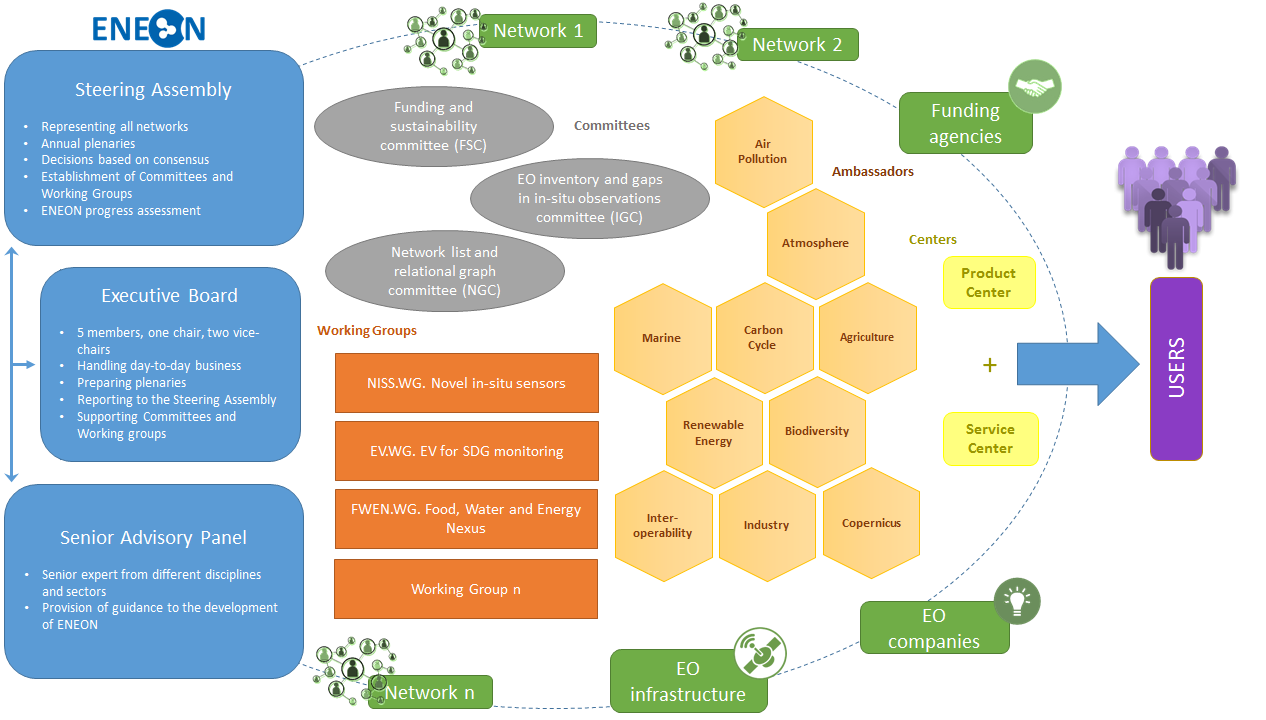ENEON structure and sustainability
ENEON structure
The work of ENEON is organized in committees and working groups that mainly meet virtually, work in the ENEON Commons and are coordinated by the ENEON secretariat. They also meet face-to-face in the steering assembly events. There is an Executive Board that is mainly run by the ENEON secretariat, and a Senior Advisory Panel that will be formed and invoked by the ENEON secretariat as the ENEON evolves.

ENEON sustainability
More information: ConnectinGEO D7.4 Strategic view for the sustainability of ENEON after the end of the project (pdf, 894 kb)
The overarching goal of ERA-PLANET is to strengthen the European Research Area in the domain of Earth Observation in coherence with the European participation to Group on Earth Observation (GEO) and Copernicus. The expected impact is to strengthen the European leadership within the forthcoming GEO 2015-2025 Work Plan. ERA-PLANET will reinforce the interface with user communities, whose needs the Global Earth Observation System of Systems (GEOSS) intends to address. It will provide more accurate, comprehensive and authoritative information to policy and decision-makers in key societal benefit areas, such as Smart cities and Resilient societies; Resource efficiency and Environmental management; Global changes and Environmental treaties; Polar areas and Natural resources. ERA-PLANET will provide advanced decision support tools and technologies aimed to better monitor our global environment and share the information and knowledge in different domain of Earth Observation.
ENEON will be part of ERA-Planet Strand 2, which aims to fully exploit data and information, tools and services that derive from the increasing multi-sensor, multi-temporal and multi-scale capacity and use of EO (in situ and space-borne), in conjunction with other cross cutting observational platforms, towards a nexus approach, to evaluate, predict and monitor the resources, and promote cross-sectorial approaches to reconcile resource efficiency and environmental management insuring the human development according to the sustainable development goals
GEO Foundational Task "GEOSS In-Situ Earth Observation Resources"
ENEON is co-leader of the GEOSS In-Situ Earth Observation Resources Foundational Task, which analyzes the current state, trends, needs, and assess gaps (geographical coverage, temporal and spatial resolution, etc.) for in-situ observing systems and networks, as they constitute a key element of GEO/GEOSS. The task puts particular focus on coordination and access to data and will provide various coordination opportunities in order to sustain and strengthen existing and planned ones, to advocate for new systems, and to encourage integration and linkages to meet user requirements which will be strongly linked with the GEO User Needs and Gaps Foundational Task and build on other on-going requirements processes outside of GEO.